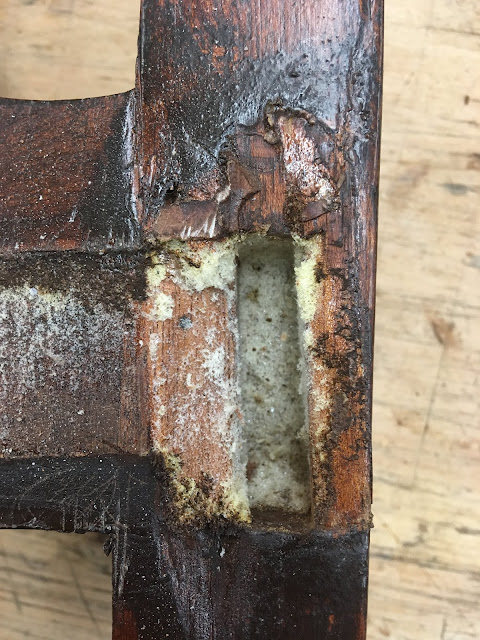 |
| Another Day at Work |
To say that I repair furniture is being modest. For 50 years I have solved two types of problems associated with antique furniture. The normal cause of wood failure is shrinkage and movement of wood as a result of age and environment. This damage is also a result of movement by careless furniture movers. You would think that professional movers would be careful with client's heirlooms. You would be dead wrong.
I have seen solid curly maple Chippendale chest of drawers arrive in two sections (upper and lower) which was not the way they were made. I saw a triple pedestal dining table put on the moving truck and then the heavy boxes of goods were stacked on top until all the legs (9 in all) broke at the same time. Another antique Cuban mahogany dining table was transported properly with the top removed from the pedestals. However, when it arrived, the mover carefully put down blankets and laid the top face down to install the pedestals. Using sheet rock screws that were at least an inch too long, he proceeded to screw on the pedestals. When he turned it over the result was shocking. It was also a difficult job to repair.
It is not always the movers. Another antique dining table was damaged by the house cleaner trying to do a good job. Her job was to polish the crystals on the chandelier which hung over the table. It seemed a good idea to stand on the table to do this work. The problem was that to reach all the crystals she decided to rotate the chandelier, instead of walking all over the table. Eventually the screw holding it to the ceiling came loose and it crashed onto the table, resulting in a thousand very visible holes. Another difficult job.
I am starting to get off topic here. Sorry. The second, and perhaps worse, type of damage is caused by amateurs (including movers) who use synthetic glue and/or sheetrock screws and nails to do the repair.
I have two prices: The best price is if you bring it to me without trying to repair it. The worst price is if you try to repair it and then bring it to me. This is the reason I insist on using traditional and reversible protein glues.
I started to use hot hide glue when I opened my business in 1969. I eventually was able to formulate a liquid version of this in 1995, which I sell as Old Brown Glue. In experimenting and formulating this glue there have been some setbacks.
For example, I went home one day and forgot to unplug one of the glue pots which was cooking the glue. When I arrived the next day this is what I discovered:
 |
| Do NOT do This At Home! |
 |
| This is What It Should Look Like |
This first video discusses the working characteristics of these types of glues. I think you will be amazed at what they can do.
Fine Woodworking Video: Protein Glue Fundimentals
I will post the second video tomorrow. Have fun and stay safe!
1 comment:
Seems like the dreaded 'home repair' is universal. I had a client whose Father 'repaired' a settle (you can tell me more about it I imagine- looks like a cross between a bench with storage under the seat and a small church pew). Good old pva was used, in abundance, without drawing the joints back together so racking was now permanent. Fortunately they were dowelled, in the most part and exposed, so I could cut through them and then clean all the pva off the french polish and the joints and wherever else it ended up. Although not large - roughly 1700 wide x1400 high x450deep it was solid jarrah and a two person lift . New dowels, discrete internal reinforcing in the corners with age appropriate slotted screws and same species, hide glue ( sorry didn't use yours, cheated and used titebond ) few other small repairs and touch up the shellac here and there. Then they complained even though they knew the hourly rate and approximate cost. I picked it up and dropped it off too for free as I had other work there at the time. I don't do this sort of restoration work a lot and have an awful lot to learn but get asked often enough to make me question what other actual restorers are doing in my part of the world. Furniture removers seem to be of the same ilk worldwide as well. Thanks for the info and experiences you impart with your site. Gav
Post a Comment